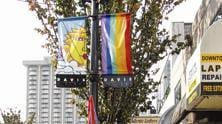The West End Business Improvement Association (WEBIA) remains committed to working with the queer community in improving the neighbourhood for business and residents alike, says the group’s current chair.
John Nicholson made the statement in the wake of former executive director Lyn Hellyar’s departure, the details of which are the subject of legal discussions. “The board decided to go in a new direction, and the direction didn’t line up with Lyn,” Nicholson says.
The WEBIA came into conflict with the gay community in 2008 when the rainbow banners adorning Davie St’s lamp standards suddenly disappeared, replaced by banners promoting that year’s Triathlon World Championships, which the BIA co-hosted.
Hellyar, who was at the forefront of the controversy, further angered the community when she told Xtra in July 2008 that she never planned to put the rainbow banners back up after the triathlon, and that new banners were to replace them.
But in the midst of community outcry against the rainbows’ removal, the triathlon banners came down sooner than planned, and the rainbow banners went back up. Those banners now run from Burrard to Broughton streets – the three-and-a-half blocks that demarcate the Village.
In an August 2008 interview with Xtra, former WEBIA chair Robert Graham said the association “listened to the community” and was committed to maintaining the unique identity of the Davie Village.
Current chair Nicholson agrees, noting that Davie St is a queer destination for visitors from around the world and should be worked with as such. “If your customer base is gay and lesbian, look after them,” he says. “That is just smart business.”
“Why would you do that? It doesn’t make any sense,” Nicholson says of the rainbow banner removal. “If you’re going to make a change like that, it should be in consultation with everyone.
“The banner flags are great,” he continues, saying that if anyone has a better idea to help identify the queer village they should bring it forward.
Little Sister’s co-owner Jim Deva says he hopes the new executive director “is somebody who realizes the potential of the Davie Village . . . to give it the promotion it needs.”
The board has hired a company to find a new executive director, a search Nicholson says is for “a visionary, someone that can look into the future, somebody that has really strong communications skills, someone that can reach out to stakeholders.”
He says that after eight years, the split between the WEBIA and Hellyar was amicable. There was no contract.
Nicholson says the WEBIA’s different direction will now be the subject of a strategic planning process borne out of a study currently underway. But, he adds, he believes WEBIA members want the Davie, Denman and Robson areas to be distinct from each other.
Part of the new direction will be further outreach to Pride. “How many people are attending Pride?” Nicholson asks. “What are we doing to encourage repeat business?”
And, Nicholson says, the WEBIA remains committed to Davie Day, the fall street fair.
“It’s a non-negotiable thing,” he says. “I think we can take it to another level.” But part of what happens in the Davie Village with the WEBIA will be contingent on the municipal planning process expected to get underway this spring, he says. The purpose of the process is to gauge community needs, Kevin McNaney of the City of Vancouver’s planning department recently told Xtra.
Deva says the WEBIA sponsored a planning session late last fall. One idea that was advanced, and which Deva agrees with, is to widen Davie Village sidewalks and to move metred parking into the alleys. He’d like to see the street be less a vehicular thoroughfare and more of a people-based one where residents and visitors can engage, have dinner or a cocktail.
“The Village has to have that vibrancy,” Deva says. “We need a reason for them to be in the Village. It’s the life in the Village; it’s the life on the street.”
Nicholson sees the WEBIA doing a number of things differently. He says the group plans to raise its profile through a revitalized web presence and the use of Facebook and Twitter. He also wants to compile statistics so people coming into the area to do business have an idea of demographics.
Nicholson also wants to increase the WEBIA’s relationship with Tourism Vancouver so businesses in the association’s orbit can plan for and capitalize on conventions that are in town.
According to the WEBIA website, the Davie Village BIA was created in 1999 under provincial legislation at the request of the business community. It was issued a new five-year mandate by Vancouver city council in 2004 and officially expanded its boundaries in April 2007 to become the West End BIA.

 Why you can trust Xtra
Why you can trust Xtra


